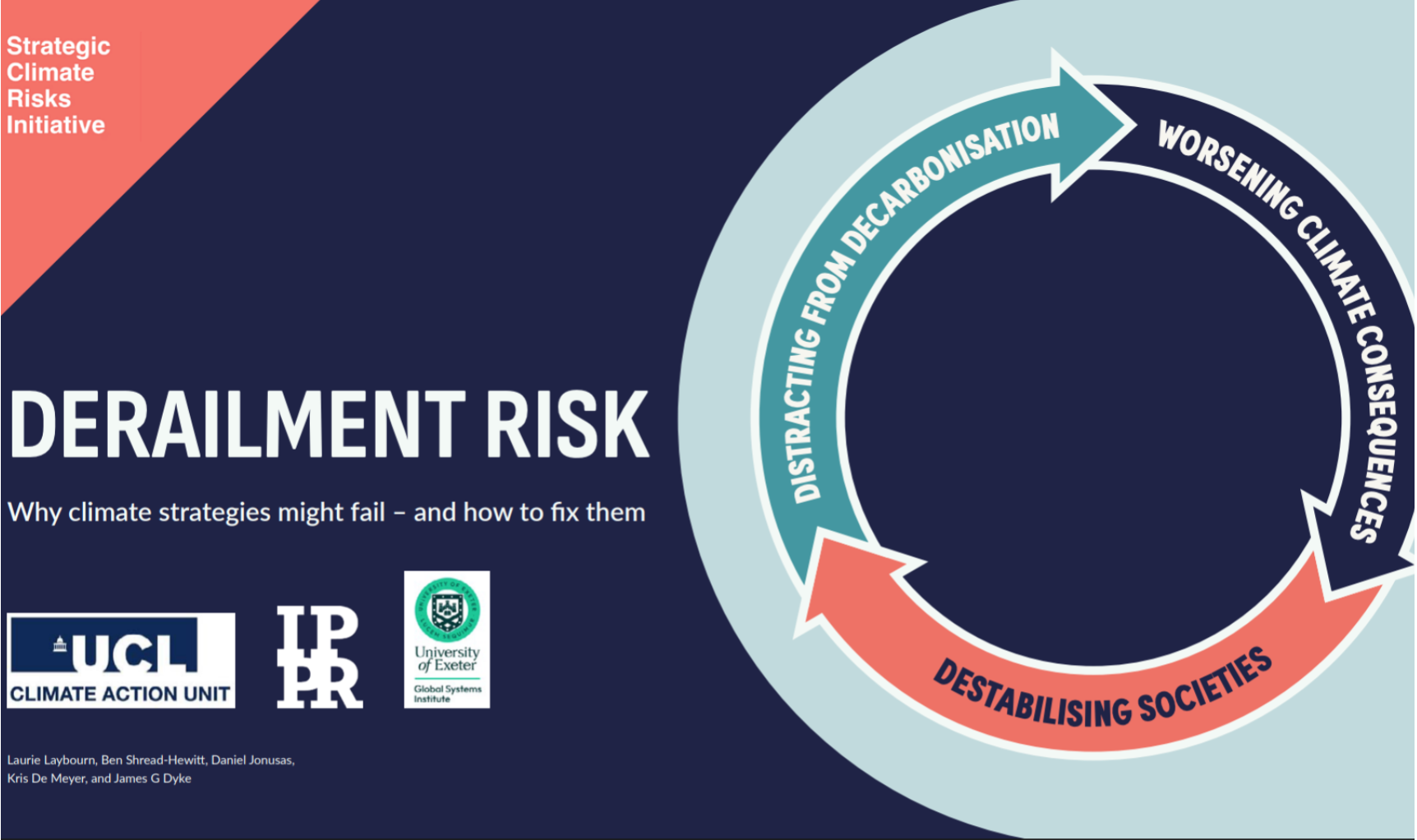Derailment warning as world faces threats to its ability to act on climate change
We may have seriously underestimated the risks of climate change. This includes derailment risks. This does not mean we are doomed, and it certainly does not mean there is no point in trying to turn off the fossil fuel spigot. In fact, the warmer it gets, the more important our actions become.

A few years ago I started working on climate risks with Laurie Laybourn. Laurie is a visiting fellow at the Global Systems Institute, and leads the Strategic Climate Risk Initiative a "think and do tank that builds tools and capabilities to navigate the new climate reality". Our first project together was looking at the consequences of collapse of the AMOC, the Atlantic Overturning Meridional Circulation. This would plunge the UK and much of northern Europe into a mini ice age and effectively end arable farming in much of the region. It would also have profound impacts for the global climate because the AMOC is a core part of the planetary heat transfer system that takes places in the oceans. It is sometime described as the tipping point that must not be crossed. But even before a complete collapse, significant changes may happen because portions of it may slow down or even stop entirely. For example, the Sub Polar Gyre that moves water around the North Atlantic. Laurie had been leading work looking at the consequences of such an event.
While the immediate or ‘first order’ impacts of significant climate change can be very serious – e.g. a lethal heatwave – it is the knock on effects or ‘higher order’ impacts that can produce extremely serious risks. Imagine the simultaneous failure of bread basket region harvests. Food prices spike, governments put in place export controls that increase prices even further, food security for people around the world collapses as they cannot access food, social instability increases, governments respond with violent suppression, tensions increase at borders. This scenario is not the results of a fevered imagination but based on actual events. Climate change keeps pushing biophysical and social systems further towards these sort of cascading feedbacks. One thing Laurie and I realised, is that the feedback loops that involve climate and people can generate doom loops that could fundamentally undermine climate action. The way Laurie puts it, is that the consequences of climate change could begin to impact our ability to deal with the drivers of climate change. I think about this in terms of systems dynamics. We have to generate and maintain a sustainability transition (e.g. away from fossil fuels and towards renewables). This transition could be derailed by climate impacts. Hence the term ‘derailment risk’.
This week we published Derailment risk: why climate strategies may fail and how to fix them. It’s (in my completely biased opinion) a very accessible introduction to the risk of cascading feedback loops and how they could rapidly generate serious risks to climate action.
Derailment can result from climate impacts, like how worsening disasters hitting low-income countries can sap resources from proactive adaptation and decarbonisation, creating more vulnerability, which leads to more expensive disasters. Derailment can also result from the consequences of climate action, like how the impacts of green policies can be exploited and misrepresented to drive a political backlash that stymies rapid decarbonisation, which could mean faster action is needed in the future, leading to more disruption that is then exploited in order to further derail climate action.
I had derailment risks in mind yesterday when I gave an interview to the Big Issue magazine about COP - the Conference of the Parties. This is the somewhat cryptic name for the annual meeting of the members of the United Nations Framework Convention on Climate Change. Since 1995, the international community has met each year in order to try to reduce humanity's dangerous interference in the climate system. Spoiler alert: they failed, and so next week's COP30 in Belém will be as much about who should pay for increasing climate change costs as about the rapid phase out of fossil fuels.
And despite what Bill Gates may claim, we must rapidly phase out fossil fuels. Unsurprisingly, his little outburst earlier this week that we should not let the climate crisis divert attentions away from poverty alleviation and health has been interpreted as some sort of Damascene conversion by the usual assortment of right-wing fossil fuel mouthpieces (and other orifices). Bill Gates is a man who’s place in history will be on the basis of him becoming the youngest ever billionaire in 1987, the world’s first centibillionaire in 1999, and the world’s richest person for 18 out of 24 years between 1995 and 2017. The only reason some people listen to him about climate change is because his net worth is still north of $100billion and they hope he may throw some of it their way.
Whatever the outcome, COP30 will be poignant, because it will mark the tenth anniversary of the Paris Agreement that was reached at COP21, Paris. A decade ago, my response to this landmark of climate diplomacy that established well below 2°C as the level of warming we must not cross was, hurrah, and fat chance. Hurrah that diplomats were able to produce such a big increase in climate ambition, and fat chance it will ever happen. Subsequent COPs defined well below 2°C as 1.5°C. Even more ambition. I realise now that there was deep inside me some sort of kernel of hope. Because beneath the cynicism I feel lays a profound sense of grief.
We have not stepped across 1.5 so much as taken a running jump. Around the time it was confirmed that 2024 was the warmest year humans have ever directly recorded, the Global Carbon Budget concluded that 2024 was also the year that saw the greatest amount of greenhouse gasses put into the atmosphere by human activities. While climate scientists were taking to the media to explain that they do not fully understand some of the extraordinary leaps in global heating, fossil fuel companies were making record profits, and global finance was funnelling hundreds of billions of dollars into the development of new oil and gas extraction.
This is madness. This is profoundly unjust. This is just what neoliberalism does. We've all offered our opinions. One that continues to bubble up is the 'a single year exceeding 1.5°C of warming does not mean that the Paris Agreement has failed'. This provides as much reassurance as the captain of the Titanic telling passengers that there is an important difference between 'sinking' and 'sunk'. It's not that they are wrong, it's just beside the point. Yes, we need many years of temperature data to be able to discern the trend in the global climate - a single year isn't enough to make a trend. And yes, the architects of the Paris Agreement were clever to only posit end of Century goals so even exceeding the long-term trend does not mean that the Agreement has failed because by 2100 we may be able to drag temperatures back down.
Whenever I come across such arguments I think of the opening scene of episode one of the first season of Better Call Saul.
Saul Goodman is a US defence attorney. We find him at some point in the mid 1990s in the toilets of a court house practicing his summing up statement at the end of a criminal trial. Sufficiently psyched, he strides into the courtroom and presents an impassioned defence of the four young men on trial. He acknowledges that their high spirits got out of hand. He appeals to the experiences of the jurors who he imagines at some point in their youth did things that now with the wisdom or their more advanced years they would judge rash and foolish. He assures them that all the defendants are profoundly ashamed of what they did, and have consistently expressed remorse. He concludes by reminding the entire court that that no one was hurt as a result of the defendants' actions.
We turn to the prosecutor to hear his closing statement. There is a pause after which he rises from his chair and slowly walks across the courtroom to an audiovisual trolley which he then wheels in front of the jury. He inserts a video tape, hits play and turns to look at the defendants. His face is picture of contempt and fatigue. He is tired with this entire trial. The facts simply speak for themselves. Because the video is handheld camera footage of the defendants in a morgue who took it upon themselves to record their drunken desecration of a corpse.
The facts speak for themselves. We have fucked the climate. Dressing this up as temporary overshoot at this point is indefensible.
Every now and then, some of the brutal realities of climate change cut through into wider discourse. Some of the reporting about the monstrous Hurricane Melissa that tore through Haiti, Jamaica and Cuba this week, mentioned that this cyclone underwent explosive intensification over seas that were significantly warmer as a result of climate change. Earlier this month, the publication of the 2025 Global Tipping Points report generated international media coverage, much of which led with the declaration that warm water coral reefs have passed the tipping point towards annihilation.
All this lends weight to the suspicion that we may have seriously underestimated the risks of climate change. This includes derailment risks. This does not mean we are doomed, and it certainly does not mean there is no point in trying to turn off the fossil fuel spigot. In fact, the warmer it gets, the more important our actions become. This demands new approaches because we need to accelerate a sustainability transition in a world that failed to avoid dangerous climate change.
There will be trouble ahead. How much trouble is still very much up to us.
